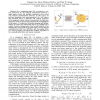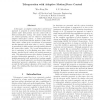10 search results - page 2 / 2 » Stability of discrete-time bilateral teleoperation control |
ICRA
2005
IEEE
13 years 10 months ago
2005
IEEE
Abstract— In a companion paper [1], we propose a control framework for the bilateral teleoperation between a single master robot and multiple cooperative slave robots over delaye...
ICRA
2005
IEEE
13 years 10 months ago
2005
IEEE
Abstract— We propose a control framework for the bilateral teleoperation between a single master robot and multiple cooperative slave robots with communication-delay in the maste...
ROBIO
2006
IEEE
13 years 11 months ago
2006
IEEE
- SuperMedia provides human operators rich environmental information, thus providing telepresence and enhances efficiency of operation. However, coupling human with the remote envi...
ICRA
2008
IEEE
13 years 11 months ago
2008
IEEE
— The time domain passivity framework is attracting interest as a method for granting stability in both telerobotics and haptic contexts; this paper employs this approach in orde...
ICRA
1999
IEEE
13 years 9 months ago
1999
IEEE
In this paper, an adaptive motion force control based approach is proposed to control bilateral teleoperation systems under both position and rate control with arbitrary motion fo...


